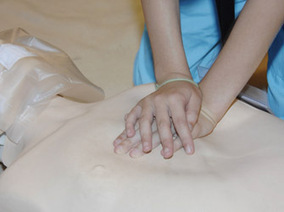See on Scoop.it – First Aid Training
“When children are given professional first aid training at primary school, the benefits can be felt long term. That’s why training in the early years is so incredibly important,” says Fritz Sterz from the University Department of Emergency Medicine at the MedUni Vienna as pupils start school this week. The results of a recent study by Katrin Steiner from the MedUni Vienna, who is writing her thesis, also highlight this fact. The anaesthetist and emergency medicine physician has demonstrated that primary school children who are given first aid training in the first to fourth grades of school score highly when it comes to using a defibrillator or performing chest compressions.
The study centres around a class of 25 school children from Vienna’s 16th district. In first grade, the children were given a professional first aid lesson as part of a project organised by Thomas Uray from the University Department of Emergency Medicine which involved practical exercises, video clips and questionnaires. After it, 47.8 per cent of the children were able to execute an emergency call perfectly, 56.6 per cent were able to operate the defibrillator correctly and 28.6 per cent were able to perform chest compressions appropriately. The class has now undergone further training and testing in fourth grade by a team led by Katrin Steiner from the MedUni Vienna. “The children were able to remember the practical, hands-on actions very well and tackled the problems in a very motivated way without any inhibitions. Only the theory side of things had slipped a little in their memories,” explains Steiner. Three years later, 100 per cent of the children were able to operate the defibrillator correctly after a refresher course, 95 per cent made the emergency call clearly and understandably, while 72.2 per cent were able to perform chest compressions correctly. Parents learn from their children “The results clearly speak in favour of first aid training at primary school,” says Steiner. In Austria, this training is not currently on the curriculum – unlike countries such as Canada, the Czech Republic or Norway, for example. Just two to three hours of training per academic year are enough to perfectly prepare children for these types of emergency. The added bonus is that “parents learn from their children and benefit from their lower inhibitory threshold for providing first aid,” says Steiner. First aid courses for children are currently provided by the Austrian Red Cross Youth, the Samaritans and as part of the Children’s University programme at the MedUni, which is held every year during the summer holidays. One third can be saved A recent study by the MedUni Vienna has shown that someone who is given cardiac massage by a first aider straight after a cardiac arrest has a 70% higher chance of survival. “Unfortunately, there is often no first aider on hand, or people are afraid of doing something wrong during resuscitation. Chest compressions never do any harm, unlike doing nothing,” says Fritz Sterz from the University Department of Emergency Medicine at the MedUni Vienna. In Vienna alone, around 3,000 people die every year from cardiac arrest.
See on medicalxpress.com


Recent Comments